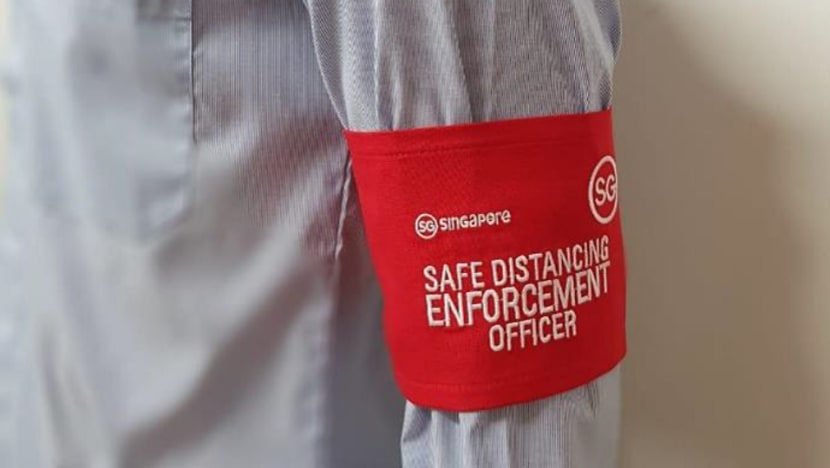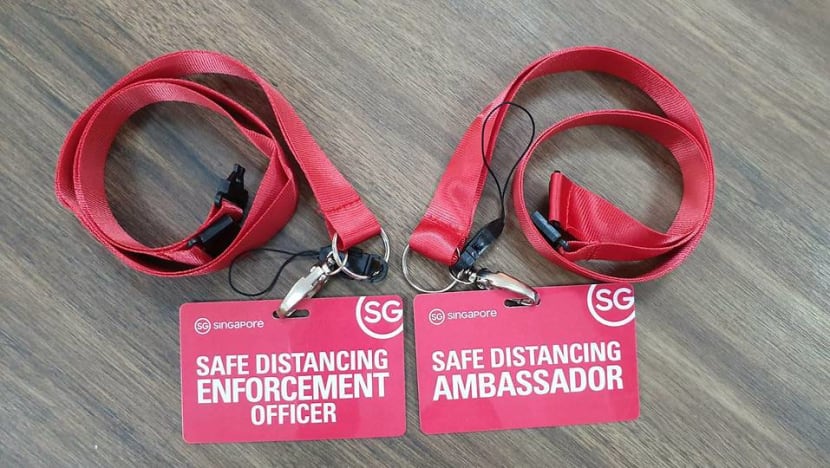FAQ: What is the difference between safe-distancing ambassadors and enforcement officers?

Enforcement officers will get red armbands so members of the public can identify them more easily. (Photo: Ministry of the Environment and Water Resources)
SINGAPORE: What are the powers of a safe-distancing ambassador or a safe-distancing enforcement officer?
On Monday (Aug 2), the Urban Redevelopment Authority (URA) issued a clarification that safe-distancing enforcement officers can enter, inspect and search various premises, including residences, without a warrant, so as to check that COVID-19 regulations are complied with.
READ: Safe-distancing enforcement officers can enter homes without warrants to check compliance with COVID-19 rules: URA
The clarification was in response to actor Nick Mikhail’s videos on social media, in which he questioned an inspection of his home. He asked why officers had entered his home without a warrant or court order.
URA said that officers “will calibrate their approach for each premises, based on the circumstances of each case”.
Q: What is the difference between safe-distancing ambassadors and safe-distancing enforcement officers?
A: According to the National Environment Agency (NEA), a key difference between safe-distancing ambassadors and enforcement officers is that ambassadors do not have the power to take enforcement action against members of the public for flouting rules, such as by issuing fines.
An ambassador’s task is to remind businesses and people of safe distancing measures, such as wearing a mask and leaving sufficient space when queuing.
An SG Clean Ambassador has similar responsibilities as a safe-distancing ambassador. They do not have powers to take enforcement action.
“Like police officers, enforcement officers are empowered to take enforcement action against the public for breaches of safe distancing measures,” said NEA on its website.
In public, anyone found to breach safe distancing measures, including failure or refusal to comply with directions of an enforcement officer, will be asked to produce his or her personal particulars, said NEA.
Q: How can I tell that someone is an enforcement officer?
A: Enforcement officers and ambassadors can be identified by their respective agencies' corporate attire, staff pass or lanyard, said NEA.
They will carry enforcement officer passes or ambassador passes.

Enforcement officers may wear a red armband, said the Environment Ministry in a media release in April 2020.
Members of the public can also ask an officer to verify their identity before complying with their instructions, said NEA.
Q: Who can be appointed as an enforcement officer?
A: According to Section 35(1) of the COVID-19 (Temporary Measures) Act, the following people can be appointed as enforcement officers:
- a police officer;
- a health officer appointed under Section 4(1)(a) or (b) of the Infectious Diseases Act;
- a public officer;
- an officer of a statutory body;
- an auxiliary police officer;
- an employee of a prescribed institution under the Infectious Diseases Act, except for the purposes of subsection 2(b).
Enforcement officers from the URA are considered public officers or officers of a statutory body.
Q: What can a safe-distancing enforcement officer do?
A: According to Section 35(5) of the COVID-19 (Temporary Measures) Act, an enforcement officer has “all the powers of a health officer” under Sections 55A, 55B and 57 of the Infectious Diseases Act.
Section 55 states that the health officer can ”enter, inspect and search any premise”, or “stop, board, inspect and search any conveyance” in which an outbreak or suspected outbreak has taken place.
They can do this at any time without a warrant, and with force if necessary, for the purpose of investigating any outbreak or suspected outbreak, or for the purpose of preventing the spread or possible outbreak of any infectious disease.
If a person is suspected of breaking COVID-19 regulations, such as exceeding the permitted number of visitors per day, enforcement officers can search their premises without a warrant.
During Phase 2 (Heightened Alert), group sizes for social gatherings are limited to two people. There is also be a cap of two distinct visitors per household per day.
Offenders will be issued notices on-site or through the mail, said NEA, adding that people should "never hand over cash" to people claiming to be enforcement officers as no immediate payment is required.
Q: Can I refuse to follow an enforcement officer's directions?
A: No. According to Section 35(9) of the COVID-19 (Temporary Measures) Act, you will be committing an offence if you, without reasonable excuse, refuse or fail to comply with an enforcement officer's directions.
Under Section 35(11) of the same Act, the penalty for refusing to comply with an enforcement officer's directions is a fine of up to S$10,000, imprisonment of up to six months, or both, for first-time offenders. For second and subsequent offences, the penalty is a fine of up to $20,000, imprisonment of up to 12 months, or both.
Under Section 186 of the Penal Code, voluntarily obstructing a public servant in carrying out their duties might result in a fine of up to $2,500, imprisonment of up to three months, or both.














